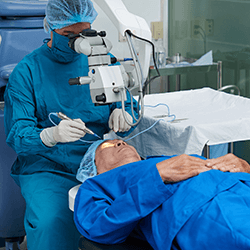- Procedure Name:
- Eye Exams Service
Routine eye exams are important for everyone and can help maintain eye health and identify eye conditions or issues with vision as early as possible.
- Procedure Name:
- Diabetic Eye Care Service
If you have type 1 or 2 diabetes, it's important to maintain routine visits to an eye care center that understands your unique needs as a diabetic.
- Procedure Name:
- Low Vision Rehabilitation Service
If you have low vision (visual acuity of 20/70), low vision rehabilitation can help you manage everyday tasks with your vision struggles.
- Procedure Name:
- Eyeglasses and Contact Lenses Service
Getting glasses or contact lenses doesn't have to be stressful; our team is here to help you find the right prescription, frame, and more.
- Procedure Name:
- Urgent Eye Issues Service
Urgent eye issues, such as vision loss, an eye injury, or chemical contact, should be treated by an eye specialist right away to maintain eye health.
- Procedure Name:
- About Cataracts Service
Cataracts are common in people over 60 and can create clouded vision. Treatment options are available to eradicate cataracts and correct your vision.
- Procedure Name:
- Cataract Surgery Service
Cataracts cause the natural lens in the eye to cloud over making it difficult to see; cataract surgery is performed to remove the lens and replace it.
- Procedure Name:
- Dry Eye Service
Dry eye syndrome is a lack of tears or unbalanced tear components, often brought on by a medicine, medical condition, or lifestyle.
- Procedure Name:
- Myopia Service
Myopia, more commonly known as nearsightedness, makes it difficult to see things far away and can cause migraines or eye aches if not treated.
- Procedure Name:
- Glaucoma Diagnosis Service
Glaucoma is known as a "silent thief" because it has no warning signs but can lead to optic nerve damage and even vision loss.
- Procedure Name:
- Glaucoma Treatment Service
A glaucoma diagnosis may sound scary; however, with early intervention and advancements in technology, you have many treatment and management options.
- Procedure Name:
- Glaucoma Surgery Service
Glaucoma surgery is performed to help fluid drain from the eye and reduce eye pressure, slowing the progression of the condition.
- Procedure Name:
- LASIK Service
LASIK is an FDA-approved laser vision correction surgery that is designed to improve vision and reduce reliance on glasses or contact lenses.
- Procedure Name:
- Eye Flashes and Floaters Service
Flashes and floaters are more common as we age; however, frequent floaters or flashes should be accompanied by an eye exam to check your eye health.
- Procedure Name:
- Macular Degeneration Service
Macular degeneration, both wet and dry, is a progressive condition, often developing with age, that can lead to vision issues if left untreated.
- Procedure Name:
- Retinal Disease Service
Retinal diseases are anything that affects the retina or macula and can often lead to low vision or blindness if not treated in a timely manner.
- Procedure Name:
- Diabetic Retinopathy Service
Diabetic retinopathy is an eye condition that affects individuals with diabetes, and it stands as the most prevalent cause of vision loss worldwide.
- Procedure Name:
- BOTOX® Injections Service
BOTOX, known for treating signs of aging like Crow's feet, can also help relieve twitching eyes, drooping eyelids, and other ocular concerns.






















